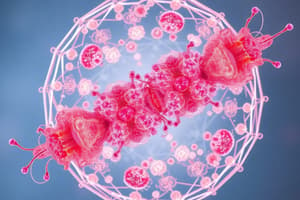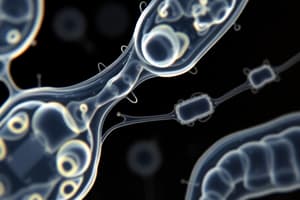Podcast
Questions and Answers
What is the purpose of cell division in unicellular organisms?
What is the purpose of cell division in unicellular organisms?
- To facilitate communication between cells
- To produce genetically identical daughter cells (correct)
- To repair damaged cells
- To increase genetic diversity
Which stage of cell division involves DNA replication and synthesis of proteins?
Which stage of cell division involves DNA replication and synthesis of proteins?
- Prometaphase
- Interphase (correct)
- Prophase
- Metaphase
What are the main phases of mitosis?
What are the main phases of mitosis?
- Prophase, Prometaphase, Metaphase, Anaphase (correct)
- Anaphase, Telophase, Cytokinesis, G1 phase
- Prometaphase, Metaphase, Anaphase, Cytokinesis
- G1 phase, S phase, G2 phase, Prophase
Which type of cell division produces genetically identical daughter cells?
Which type of cell division produces genetically identical daughter cells?
What is the function of meiosis in organisms?
What is the function of meiosis in organisms?
What is the primary role of mitosis in multicellular organisms?
What is the primary role of mitosis in multicellular organisms?
What is the main purpose of meiosis?
What is the main purpose of meiosis?
How do unicellular organisms differ from multicellular organisms in terms of cell division outcomes?
How do unicellular organisms differ from multicellular organisms in terms of cell division outcomes?
What is the evolutionary significance of cell division discussed in the text?
What is the evolutionary significance of cell division discussed in the text?
How do unicellular organisms adapt to various environments over billions of years?
How do unicellular organisms adapt to various environments over billions of years?
What differentiates the outcomes of cell division in unicellular and multicellular organisms?
What differentiates the outcomes of cell division in unicellular and multicellular organisms?
Why is cell division considered a fundamental process in shaping the evolution of life on Earth?
Why is cell division considered a fundamental process in shaping the evolution of life on Earth?
Flashcards are hidden until you start studying
Study Notes
Unicellular Organisms and Cell Division
Unicellular organisms are life forms that consist of a single cell. They come in diverse forms, such as bacteria, archaea, protozoa, and algae, and play a vital role in shaping Earth's ecosystems. One of the most fundamental processes that unicellular organisms engage in is cell division, which allows them to reproduce, grow, and maintain themselves.
Cell Division Process
Cell division involves the duplication of an organism's genetic material (DNA) and the partitioning of cellular components into two new daughter cells. The process occurs through two main stages:
-
Interphase: During this stage, the cell actively prepares for division by carrying out essential functions such as DNA replication, synthesis of proteins, and production of necessary cellular components.
-
Mitosis (or Meiosis): Once the cell has completed interphase, it enters the process of cell division, which is further divided into four main phases: prophase, prometaphase, metaphase, and anaphase. These stages result in the duplication and equal partitioning of genetic material and cellular components between the two daughter cells.
Cell Division Types
There are two primary types of cell division, mitosis and meiosis, each with distinct functions.
- Mitosis: This process is responsible for producing two genetically identical daughter cells (somatic cells) from one parent cell. Mitosis is a crucial process for the growth and repair of organisms.
- Meiosis: Meiosis is a specialized form of cell division that results in four haploid cells from one diploid parent cell. This process produces gametes (egg and sperm cells) that are necessary for sexual reproduction.
Differences in Cell Division Between Unicellular and Multicellular Organisms
While both unicellular and multicellular organisms engage in cell division, there are some significant differences, particularly in the processes that occur after cell division.
- Unicellular organisms: After cell division, the unicellular organism becomes two genetically identical cells that continue to function independently. In some cases, these cells can also unite to form multicellular structures, but the new structure will still have a single cell lineage.
- Multicellular organisms: Multicellular organisms have specialized cell types that form tissues, organs, and systems. After cell division, the cells have distinct roles and functions, and their genetic material does not need to be identical.
Evolutionary Significance of Cell Division
Cell division has played a crucial role in shaping the evolution of life on Earth. By allowing for the reproduction, growth, and repair of organisms, cell division has facilitated the development of complex life forms and adaptive strategies.
Unicellular organisms have existed for billions of years, and their ability to divide and adapt to various environments has enabled them to continue to thrive and evolve. As life evolved into more complex forms, cell division has remained a fundamental process, allowing multicellular organisms to develop diverse structures and functions.
In summary, cell division is a fundamental process that unicellular organisms engage in to reproduce, grow, and maintain themselves. The process of cell division is essential for shaping the evolution of life on Earth and has played a vital role in the development of both unicellular and multicellular organisms.
Studying That Suits You
Use AI to generate personalized quizzes and flashcards to suit your learning preferences.




